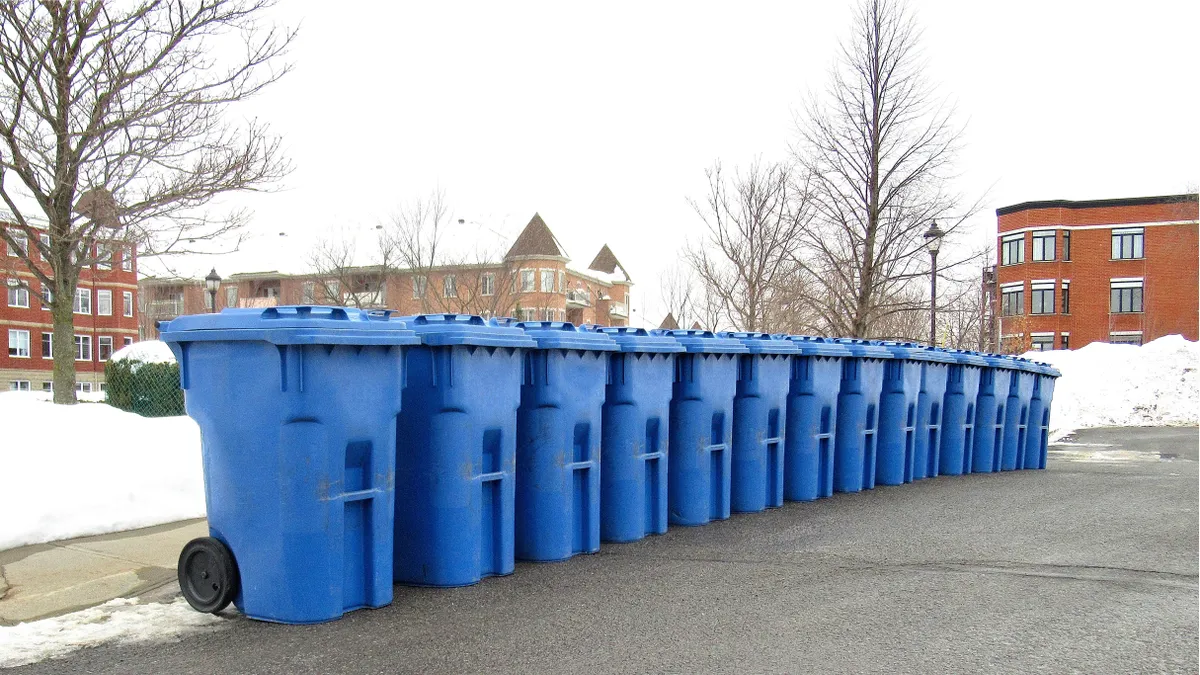Recent changes in provincial extended producer responsibility regulations in Canada could offer positive business opportunities for companies with a focus on residential collection and MRF operations, according to comments from major companies during recent earnings calls.
Several provinces are in the thick of updating EPR programs. Ontario is in the process of rolling out a series of updates to make paper and packaging producers fully financially responsible for the EPR system known as the “Blue Box” program, a process that will continue through 2025. This has opened up chances for waste companies to bid on contracts and monitor other possible business opportunities.
Meanwhile, provinces such as Quebec, Saskatchewan, New Brunswick and Alberta are in the process of updating their EPR programs, while provinces such as Newfoundland and Labrador, as well as the Northwest Territories, are mulling whether to adopt packaging EPR programs of their own.
Waste companies are also monitoring EPR in the U.S. Four states are in the process of implementing EPR for packaging rules, which executives said could potentially offer opportunities to coordinate with producer responsibility organizations in the coming years.
Here’s how three of the industry’s largest waste companies plan to approach EPR opportunities in 2024 and beyond:
GFL will pursue more Ontario EPR contracts this year
A large portion of GFL Environmental’s sustainability spending in 2024 will go toward MRFs and investments that could help position them to pursue more EPR-related contracts in Canada, executives said during their Q4 earnings call. GFL expects to spend $250 million to $300 million on both EPR and RNG projects, with about two-thirds of that money going toward EPR projects.
Among its ongoing MRF projects is a planned facility in Montreal meant to process up to 52 tons per hour, Recycling Today reported.
CEO Patrick Dovigi said the company’s “strong asset position in Canada, including our state-of-the-art MRF network,” has already helped the company win a “significant number” of EPR-related contracts. GFL expects to begin generating earnings from EPR-related capital expenditures by the end of 2024, and it estimates that by 2026 current EPR contracts could bring in an adjusted earnings before interest, taxes, depreciation and amoritization of $80 million to $100 million.
Dovigi said the opportunity in EPR is “significantly larger” than the contracts GFL already has secured, following positive momentum in 2023. He expects to be able to win additional EPR contracts as more collection contracts move from municipalities to producers in the next 12 months.
“We think we're positioned very favorably,” he said. “Obviously, we're not bidding on them all. We're bidding on the ones where we're being selective about where we already have infrastructure, where we already have people, where it's an easy sort of turnover [and] not a lot of start-up risk.”
WM’s upcoming recycling projects to leverage Ontario EPR changes
As Ontario gradually rolls out more EPR provisions, WM sees the regulatory landscape as an opportunity for the company to leverage the technology assets it already has and win more business. WM was recently awarded two new “recycling projects” in the province, which Chief Sustainability Officer Tara Hemmer said are related to EPR activity there.
“Extended producer responsibility in Canada and the structure that we have there, it really is around us using those assets as manufacturing plants and really it’s a fee-for-service model,” she said during the Q4 earnings call on Feb. 13. “It's a great example of how we can leverage this technology differentiation for more business in the future.”
Meanwhile, WM is working to build more partnerships with PROs in both Canada and the U.S. and keeping an eye on how localities roll out their new and updated EPR laws.
“We're actively tracking throughout Canada, and then of course looking at where there is pending legislation in the United States as well,” Hemmer said. “There's obviously Colorado as an example … making sure that we're well-positioned to respond to the PROs when they eventually implement.”
Waste Connections won’t make Canadian EPR a business focus
Unlike the other companies, Waste Connections has been “intentional” about not engaging with Ontario’s recent EPR contract award process.
“We think the EPR opportunities in Canada are nice opportunities for providers whose business is predominantly a residential platform,” said CEO Ron Mittelstaedt during a Q4 earnings call on Feb. 14. Waste Connections shed most of its residential business in Canada since merging with Progressive Waste Solutions in 2016. “We are much more of a commercial and disposal platform company in Canada,” he said.
Mittelstaedt added that the company likely wouldn’t move into the residential and municipal contract business in Canada due to the fact that many of those contracts are only about five years long.
“Those are very short-term contracts,” he said. “And if you have assets, particularly MRF assets that are underutilized, and you are able to add a relatively nominal amount of capital, those investments make a lot of sense. That’s not our asset platform in Canada.”
However, Mittelstadt also stressed that the U.S. business side will continue to grow its recycling focus “over time” with technology upgrades that make “recycling a better business model every day, every year and can produce some very acceptable returns with the right market and the right technology.”
Mittelstaedt also acknowledged a greater “push for diversion legislation and recycling in many [U.S.] states” that will continue to develop in coming years. “We are good with that. That extends the life of our landfills, which are a non-replicable asset,” he said.
CFO Mary Anne Whitney added that increasing the amount of recyclables the company processes itself is among the company’s sustainability objectives. WM and GFL also have goals to boost recycling volumes.























